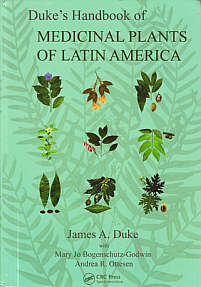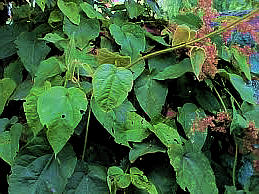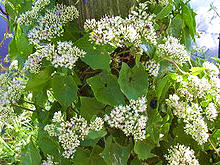Cipo Cabeludo is a very small, shrub-like vine, known for its small flowers.
Taylor designates this herbal as "Mikania hirsutissima"; Duke as "Mikania banisteriae,"
however, both names refer to the same plant species. Like most species of the Mikania
genus, with the exception of M. micrantha and M. scandens, it is endemic to South America.
Other common names for this herbal include Cipo Cabelundo, Erva Dutro, and Guaco.
Uses & Protocols

Taylor notes that Cipo is not widely used outside
of Brazil. (Here in Ecuador, its use has been diminished, due to extensive habitat loss.)
Common indications include: albuminuria, arthritis, colic, cystitis, diarrhea, enterosis,
gallstones, gastrosis, gout, hyperuricemia, intercostal neuralgia, kidney stones, lumbago,
myalgia, nephrosis, neuralgia, pain, paralysis, prostatitis, rheumatism, urethrosis,
and UTI's." Dosage: one capsule, two times a day. (Ethnobotanical uses include infusions
at 1/2 cup twice daily; tincture: 5-10 ml., twice daily.)
Warnings & Contraindications

We recommend NOT using this herbal if you are on
either diuretic or blood thinning medications, as Cipo may potentiate the effects.
Shelf-Life

Five years or more.

Medicinal Activities
 Further information for practitioners:
Further information for practitioners:
World-famous botanist Dr. James Duke attributes the following activities
to this plant
(p. 448-449; see hardcopy cover at right,
purchasable on Amazon),
drawn from the extant literature. (See his graduation for "level of
efficacy" on our
amazon traditionals page;
followed by Duke's bibliographic abbreviations (in capital letters),
which we
identify
on a separate page.)

Duke provides a "
food farmacy potential" score for this
plant of "FNFF=?."
- Analgesic (f; MPB; RAI)
- Antiaggregant (f; RAI)
- Antiinflammatory (1; X12237807)
- Antileukemic (1; X10553640)
- Antiproliferant (1; X15081289)
- Antiseptic (1; RAI)
- Cytotoxic (1; RAI; X10553640)
- Diuretic (f; RAI)
- Expectorant (f; RAI)
- Hyporicemic (f; MPB)
- Molluscacide (1; RAI; X6548884)
- Mucolytic (f; RAI)
- Nervine (f; RAI)
Indications
 Further information for practitioners:
Further information for practitioners:
Duke provides the following indications for this plant:
- Albuminuria (f; MPB; RAI)
- Arthrosis (f; RAI)
- Bronchosis (f; RAI)
- Cancer (1; RAI; X10553640)
- Colic (f; RAI)
- Cystitis (f; RAI)
- Diarrhea (f; MPB; RAI)
- Enterosis (f; RAI)
- Gallstones (f; RAI)
- Gout (f; RAI)
- Hyperuricemia (f; MPB; RAI)
- Infection (1; RAI)
- Inflammation (1; X12237807)
- Kidney Stones (f; RAI)
- Leukemia (1; RAI; X10553640)
- Lumbago (f; RAI)
- Myalgia (f; RAI)
- Nephrosis (f; MPB; RAI)
- Nervousness (f; RAI)
- Neuralgia (f; MPB; RAI)
- Pain (f; MPB; RAI)
- Paralysis (f; MPB)
- Prostatitis (f; RAI)
- Rheumatism (f; MPB)
- Urethrosis (f; RAI)
- UTIs (f; RAI)


 Recent Studies on Cipo Cabeludo
Recent Studies on Cipo Cabeludo
